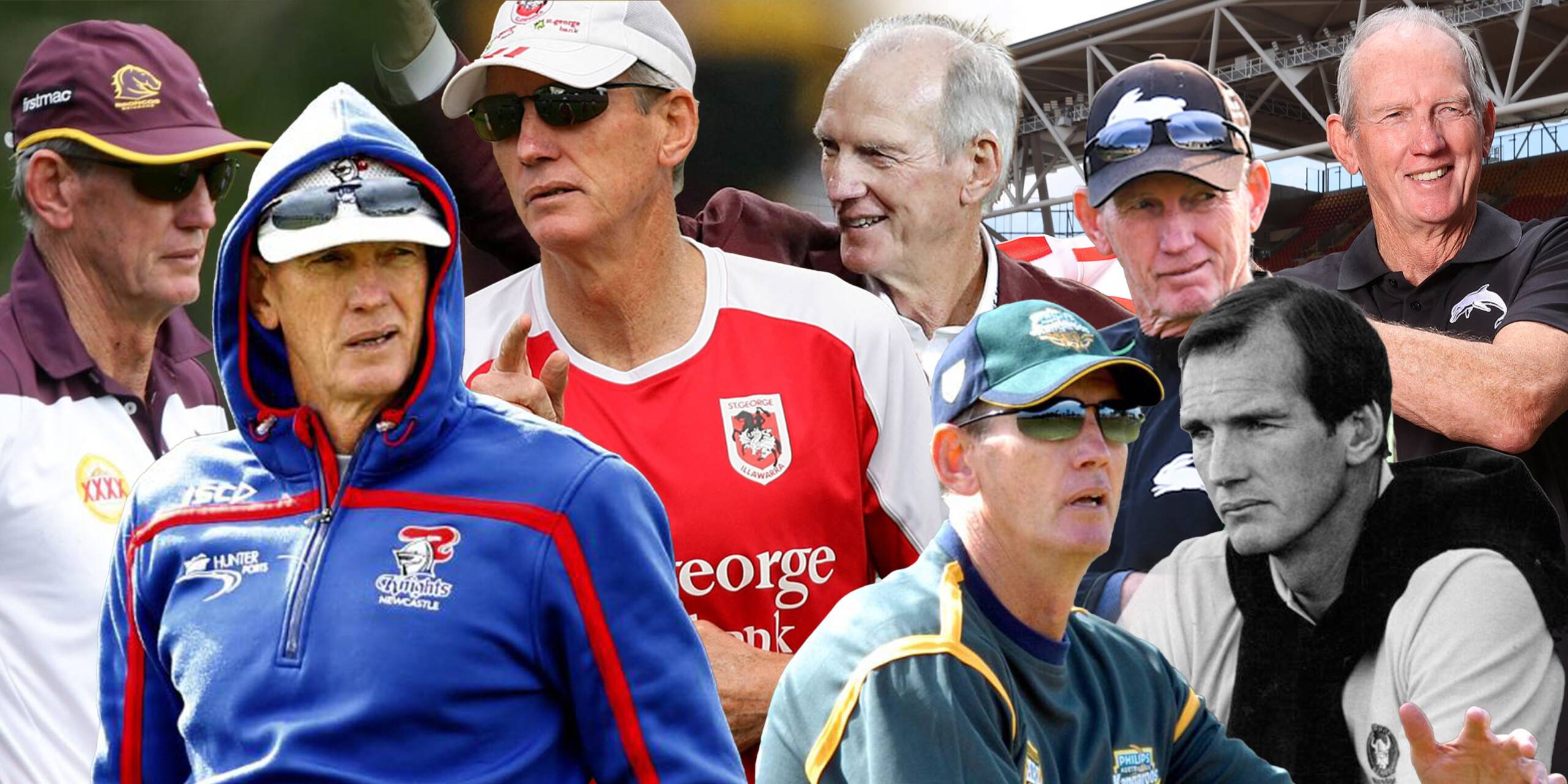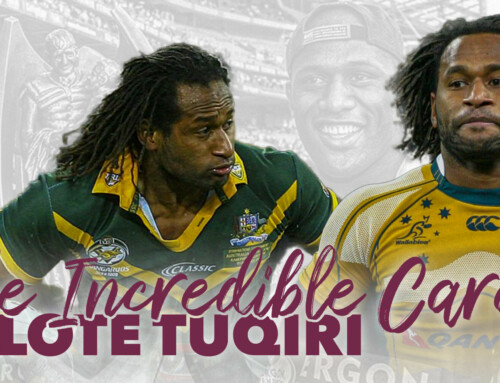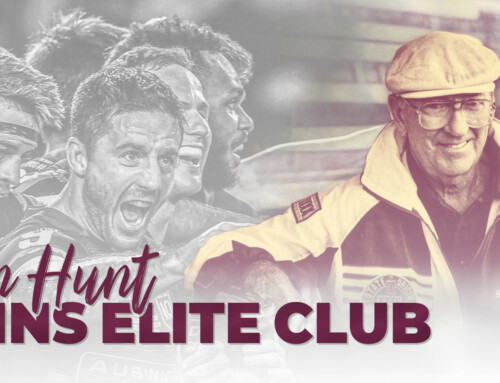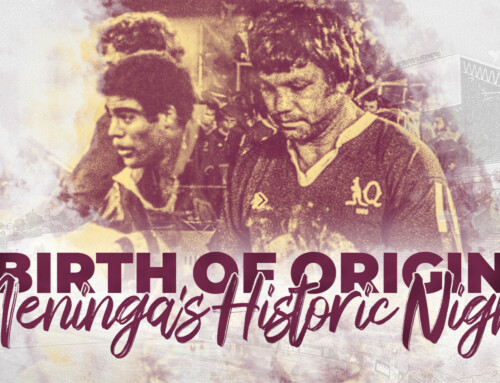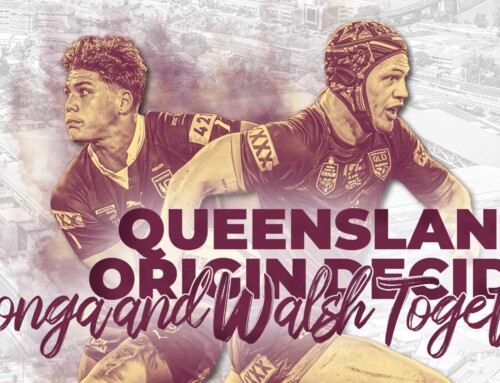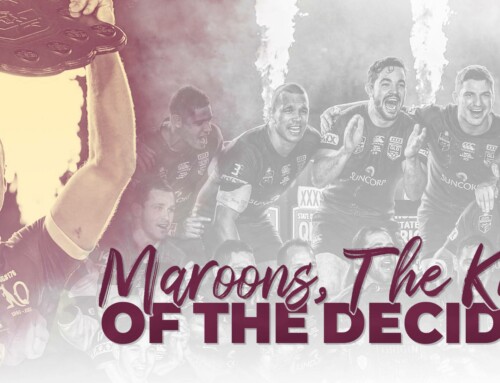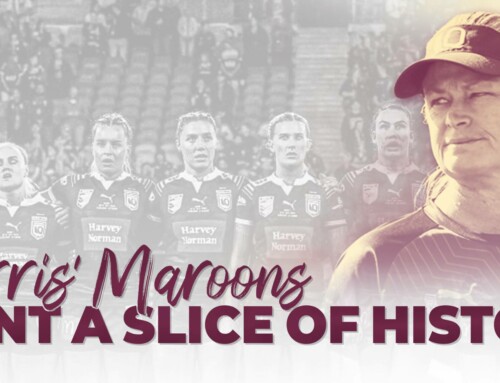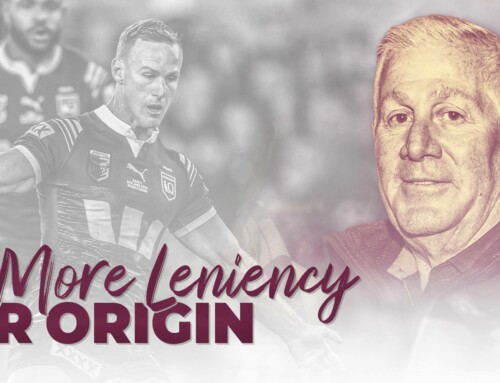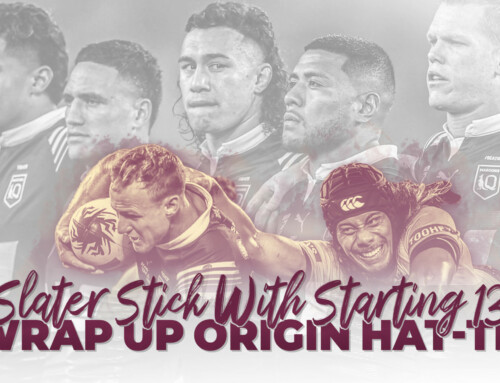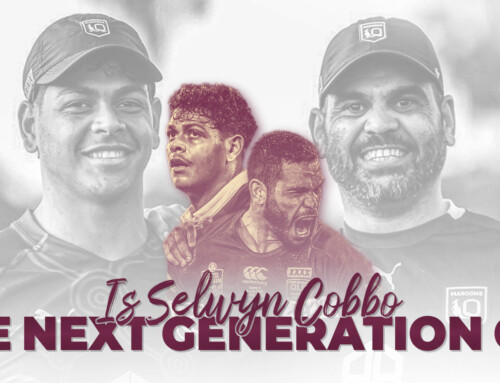By Wayne Heming
Andrew Gee’s relationship with Wayne Bennett was far more than just a player-coach bond.
Gee played every one of his 255 NRL games under Bennett.
It’s fair to say he would have taken a bullet for his coach who in turn trusted him completely whenever he needed a job done.
Gee’s loyalty to Bennett as a player was never questioned with the pair building a strong friendship that has endured years after his retirement in 2003.
But it’s always been a private relationship.
However, the tough, uncompromising forward was willing to open up a little about it on the eve of Bennett’s 900th game against Cronulla on Saturday at his favourite Lang Park ground where they shared so much success.
“Wayne obviously had a massive influence on me when I was a young fella,” said Gee.
Gee chuckles when he recalls his first meeting with Bennett at his parent’s farm.
“Wayne asked me if we could go out on the veranda and have a talk,” he said.
“We walked outside and he said: ‘It’s all sorted’ and then he asked who put the photo of me in an Australian Schoolboys jersey up on the wall inside.
“I said my mum (Caroline) did and he replied: ‘well, take it down and stop falling in l love with yourself’.
“I remember thinking to myself right then, I want to be around this bloke because I didn’t like it up on the wall either.
“I told Mum and she took it down.
“I went back to Mum’s farm a couple of years ago and you wouldn’t believe it, the same photo was back on the wall.
”I took a picture of it and sent it to Benny and we had a good laugh about it.”
So what defines coaching greatness?
Success, longevity, accolades, and awards, or the sacrifices a person makes to the sport he dedicates a lifetime to.
In Bennett’s case, it’s a mix of all those things plus his deep love and passion for the game of rugby league and for helping young men, not only play the game but more importantly, become better human beings.
“Away from footy Wayne cared about his players, he made sure everyone was ok off the field,” said Gee.
“Footy was always secondary to that.
“He is still a mentor to me today but when you are in the footy ranks, he was like a father figure to his players.
“He wanted his players to enjoy their footy and to have fun doing it. The public doesn’t get to see that side of Wayne.
“He was protective of his players because it could be a pretty evil world out there.”
“He always looked after his players, but when there was a hard conversation to have, he had it. There was no bullshit about it and he looked you in the eye.
“You always knew as a player that Wayne had your back and you never wanted to let him down.”
Former Brisbane captain Darren Lockyer enjoyed tremendous success with Bennett at club, interstate, and Test level, during their 14-year relationship.
“In my first five years with Wayne, we had three premierships,” he said.
“His ethos to always get the best out of an individual has always been one of Wayne’s biggest strengths.”
Lockyer said Bennett had a softer side than some sections of the media painted.
“It’s almost like it was Wayne’s way of deflecting attention away from his players. It’s part of the reason players loved playing for him because they knew he cared so much.
“He takes an interest in everyone. He loves standing at the back of the bus and listening to all the jokes.
“Nobody handles the media better, but there is a softer side of him behind the scenes.”
Bennett transitioned Lockyer from fullback to five-eighth in 2004 when he was the number one fullback in the world.
“There had been a bit of talk and speculation about it in the media and Wayne and I had talked about it,” recalled Lockyer.
“I was probably ready for another challenge and the club was struggling for stability in the halves after Alfie (Allan Langer) and Kevvie (Kevin Walters) left and we both felt it was in the best interests of the team.
“I knew the risks involved, I could have lost my representative jumper but Wayne worked with me and helped me.
“We went on the journey together and we won the premiership in 2006.”
Bennett was abandoned by his alcoholic father as a young boy growing up in the small Queensland country town of Allora, near Warwick.
He began mentoring and shaping the lives of young men as both a coach and father figure with his first gig with Ipswich — some 47 years ago.
In almost a half-century of top-grade coaching, he has built a resume littered with multiple premierships, Origin series, and Test wins almost as thick as an old white pages telephone book.
On Saturday he’ll take his seat in the box at Lang Park – for what will be his 900th match, 10 games into his latest coaching role in charge of the Dolphins franchise.
He won’t be keen to talk about his unique milestone before the game but he has a media press conference booked for Friday during which a throng of journalists will press him for his thoughts on number 900.
Knowing Bennett, he’ll do his best to pass it off as “just another game”.
But it’s not.
It’s a milestone that takes some getting your head around when you consider most rugby league coaches only have 24 games in a regular season –unless of course, they make it all the way to the grand final.
Bennett has done that nine times during his decorated career.
His return is a remarkable eight grand final wins and an epic one-point loss in the other to North Queensland in arguably the greatest if not one of the greatest grand finals ever played in 2015.
Bennett’s first premiership came as co-coach alongside the late Don Furner at Canberra in 1987, the year before he was head-hunted by Paul “Porky” Morgan for the consortium which owned the Brisbane Broncos.
His next six titles were all with the Broncos, the club he set up, in 1992-93-97-98-2000-2006.
His seventh premiership created history, taking the mighty Red V, St George-Illawarra Dragons to victory in 2010 — breaking a long premiership drought for the club and its fans.
Bennett also won a Brisbane premiership with Brisbane Souths in 1985.
So, in terms of greatness, where does Bennett sit?
He has to rate up with the very best – the elite.
When you think about great coaches, or when I do, names such as Vince Lombardi (five NVL Championships in a seven-year stretch), the incomparable Sir Alex Ferguson (over 800 games and 13 titles as Manchester United manager) Phil Jackson (11 NBA titles), Johnny Lewis (multiple world boxing titles), Ric Charlesworth (Olympic hockey medals), Harry Hopman (coach of tennis greats John McEnroe and Ken Rosewall), Norm Smith (AFL legend) and so many other greats spring to mind.
Bennett and Sir Alex were alike in some ways, mostly their ability to unearth young talent.
Both have a great eye for young talent and the ability to develop them into stars and in some cases, superstars.
The late Bart Cummings could spot a Melbourne Cup winner walking around in a paddock.
Bennett and Ferguson could spot a footballer running around an oval and make him a good player, or even a great player.
Ferguson turned a bad (drinking) culture at Manchester around when he took charge as manager in 1986.
His no-nonsense attitude and discipline transformed the English Premier League club into one of the most admired and successful sporting franchises in the world.
Bennett, also a stern disciplinarian, created his own culture at the Brisbane Broncos, considered the NRL’s flagship from day one in 1988 until he left in 2009 to coach the Dragons.
He returned to Red Hill for four seasons 2015-16-17-18 before an acrimonious split saw him link up with South Sydney for three years.
All up, he has coached six NRL clubs with 629 of his 899 games at the Broncos.
Like him or hate him, you have to admire Bennett’s record as a coach at all levels.
He certainly belongs at the top of the tree in Australian sport with over 550 wins at a career average of 62 percent.
His record of achievements stacks up alongside some of the best and most successful sporting coaches in the world.
To put his record into some kind of perspective he has coached more wins than Craig Bellamy has coached NRL games in his career.
His early influences included coaching guru Bob Bax as well as the late Paul Broughton and his much-loved “recruiting scout” Cyril Connell who before his passing in 2009 uncovered many wonderful players for him and the club.
A School teacher who played halfback for Australia, Connell, would drive his trusty old car, the length and breadth of Queensland clocking up thousands of miles looking for young kids he thought deserved a chance to make it.
It was said Connell knew the best pie shops in every town in Queensland.
Bennett marveled at Connell’s kindness and kind heart saying he would occasionally bring a young kid to the club, not because he had the talent to be a future player, but because he wanted the youngster to have an experience of a lifetime.
“He was a truly remarkable man who touched so many lives, said Bennett of his great friend.
“He gave so many young guys opportunities they would never have got – not only in football but in his career as a teacher as well.
“He was an absolutely, outstanding man in everything he did. He carried great humility wherever he went and with whoever he touched.
Bennett has never wavered from his philosophies about coaching or his belief that rugby league is a simple game.
They are rules that still hold true, even in today’s modern game.
According to Gee, Bennett hasn’t changed “at all”.
“He has had to adapt and change as the game has changed and modern society has changed and he has done that.
“But those hardcore ethics, he has have never changed.
”One of the great things Wayne taught me and Alfie (Allan Lockyer) and Shane Webcke and Darren Lockyer and all his players was to be humble.
“Those things were non-negotiable with Wayne.”


